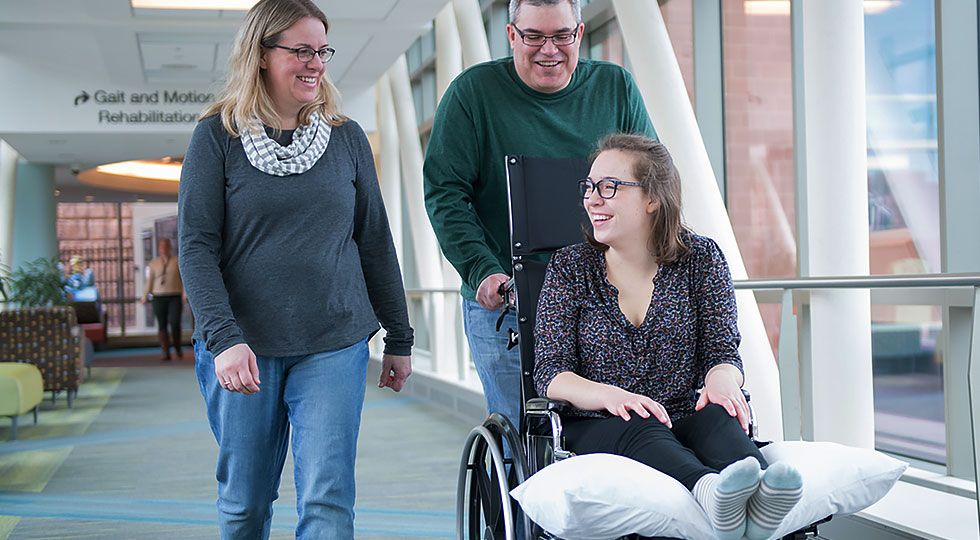
Take Action
A History of Advocacy
Gillette Children’s was founded because of the advocacy of Dr. Arthur Gillette and Jessie Haskins. And 125 years later, we continue to build on this legacy, as we know that decisions made by policymakers can have a real-life impact on our patients and their families. That is why our team works every day to make a meaningful difference in the lives of our patients. We do this through advocacy to influence public policy and through active community engagement. We work closely with organizations and policymakers on the local, state, national, and international level to advocate for patients with brain, bone, and movement disorders.
Gillette State Priorities for 2024 Legislative Session
We have partnered with the Minnesota Society of Orthotist's, Prosthetists, & Pedorthists and Wiggle Your Toes to support So Minnesotans Can Move legislation.
This bill requires Minnesota health plans to provide coverage for orthotic and prosthetic devices, supplies, and services, including repair and replacement, at least equal to the coverage provided under federal law. Health plans also must cover orthoses and protheses determined by the enrollee’s provider to be the most appropriate model that meets the medical needs of the enrollee for purposes of performing physical activates, including but not limited to running, biking, swimming and bathing/showering.
This bill also states health plans cannot deny a prosthetic or orthotic benefit for an individual with limb loss or absence that would otherwise be covered for a nondisabled person seeking medical or surgical intervention to restore or maintain the ability to perform the same physical activity.
Consumer-Directed Community Supports (CDCS) is Minnesota’s self-directed care option under Home and Community-Based Services (HCBS) Waivers and is used by thousands of people with disabilities across the state. Individuals who use the CDCS option receive an annual waiver budget from the county and then choose how to spend that budget within the program's parameters.
CDCS participants experience various obstacles that inhibit their ability to receive services. There can be confusion with how budgets are calculated. Moreover, participants may experience different outcomes based on the county they live in. This proposed legislation:
- Requires lead agencies to provide consumers with information on how their CDCS budgets is calculated, what they would get if they chose traditional waiver services and the right to appeal;
- establish that county CDCS policies cannot be inconsistent with the Department of Human Services policy and have no force or effect of law in an appeal;
- allow for State Medical Review Team (SMRT) referrals from any hospital-based or clinic-based licensed independent clinical social worker in the state;
- clarify that goods and services that directly benefit a CDCS recipient can be used by others;
- clarify that goods and services that promote community integration are allowed; and
- clarify that individuals providing personal assistance, including parents, can be paid at an enhanced rate if necessary to meet the person’s assessed needs.
When a physician orders treatment for a patient, insurers often require prior authorization before care can be provided. Prior authorization can be needed for some services; however, overuse of the process delays needed care and adds to administrative costs. This legislation improves the prior authorization process for patients and allows prior authorizations to remain in place for chronic conditions unless the standard of care changes. Chronic conditions are defined as is a condition that is expected to last one year or more and:
- requires ongoing medical attention to effectively manage the condition or prevent an adverse health event; or
- limits one or more activities of daily living.
Gillette Federal Priorities
Questions about federal priorities or how to get involved? Contact Andrea Stoesz, director of external affairs, andreaestoesz@gillettechildrens.com
We support legislation which would direct the Center for Disease Control to establish a research program to support research on the diagnosis, treatment, mitigation, health care costs, and societal costs of cerebral palsy and track the number of people diagnosed with CP in the United States.
Gillette supports legislation which expands access to genetic and genomic testing through the new authorities granted to the Centers for Medicaid and Medicare Services (CMS).
Eliminating Eligibility Redetermination for Individuals with Disabilities:
We support eliminating Medicaid renewal requirements for individuals with lifelong disabilities.
Disproportionate Share Hospitals (DHS) serve a significantly disproportionate number of low-income patients and receive payments from the Centers for Medicaid and Medicare Services (CMS) to cover the costs of providing care to uninsured patients. Gillette is a disproportionate share hospital. Under current law, Medicaid DSH reductions are scheduled to occur from the fiscal years 2024 – 2027. The aggregate reductions to the Medicaid DSH allotments are $8 billion per year. Gillette is advocating against cuts.
